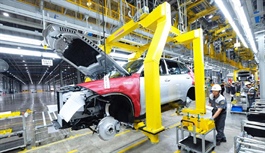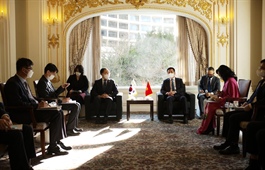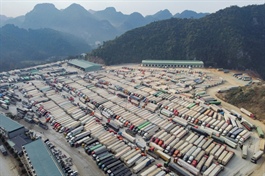Struggling casinos diversify to entice new type of custom
Struggling casinos diversify to entice new type of custom
While newly-issued decrees for business in prize-winning electronic games for non-nationals in Vietnam is expected to bring better management in the sector, some outstanding issues are been reflected on.
Taking effect on February 12, Decree No.121/2021/ND-CP will replace and improve upon previous legal documents on prize-winning electronic games for non-Vietnamese in the country.
A separate document, Decree No.137/2021/ND-CP, regulating sanctions in betting businesses and on prize-winning games, was issued on December 31 (see box).
Decree 121 meanwhile regulates that casino business areas must be isolated from other business areas, having separate entrances and exits, and electronic equipment and camera systems must be installed to regularly monitor all casino and electronic game centres for 24 hours a day.
According to casino expert Augustine Ha Ton Vinh, the decree states that camera images must be fully archived for at least 180 days from the recording date, as compared to 30 days in the previous regulation.
“This change is very good for both management bodies and enterprises themselves, to have enough time for solving any problems that arise during operations,” Vinh said. This change also aligns Vietnam with international standards.
However, the new decree contains holes that should be further considered in order to be clarified in guideline circulars later on.
According to Vinh, in Article 18 on the rights and obligations of electronic game providers, enterprises trading in prize-winning electronic games are obliged to make full and timely payment to players, but this time is not actually specified.
Elsewhere in the world, Vinh said, the time for paying prizes for players is more detailed within a specific time. “For example, the international playground applies 24 hours for this issue,” he said.
In Article 12 on the management of conventional currencies, the decree states that the “conventional currency” means coins, cards, vouchers, converted scores, and other forms of cash substitutes that are used in place of money to serve the organisation of prize-winning electronic games and can only be used in that casino.
However, Vinh said the article is outdated because coins are no longer used in Vietnamese casinos or electronic gaming centres. “The government should update this change and delete coins out of this list,” Vinh said.
The rest of the decree remains unchanged from previous versions. Accordingly, enterprises doing business in casinos and electronic game centres are allowed to organise prize-winning games at only one site as licensed by authorised state agencies. The players permitted at Vietnamese casinos are foreigners and overseas Vietnamese who are in the country legally. They must bring along eligible documents that prove they belong to permitted groups and commit to fulfilling tax obligations.
Although many investors previously lined up to create a casino business in Vietnam, many now report severe losses, especially since the beginning of 2020.
Donaco Group is one such group. Despite reopening in May 2020, the troubles last year in terms of travel restrictions mean that Donaco’s Aristo Casino Hotel in the northern province of Lao Cai has had nothing but a hard time.
Donaco CEO Lee Bug Huy told VIR that it would continue to implement strategic initiatives, including targeting clientele from the local region, alongside disciplined capital management and a reduction in costs. “We are confident in the long-term outlook for the business. Vietnam has a lot of potential and we are confident that once borders reopen the situation will stabilise,” he said.
From a strategy point of view, Donaco said they had done everything to fix the business internally.
“We are positive on Aristo’s outlook, considering that our strategy here is predominantly focused on the hotel and restaurant side of the business. Sapa is one of the key attractions in the region, and Aristo benefits from its proximity, being the closest hotel to the attraction. Therefore, we are confident in Aristo’s performance from a hotel and restaurant point of view,” he added.
Huy said that the casino business is more complicated than many other sectors due to the impact of the pandemic because it is almost entirely based on international tourists.
“Nevertheless, we are trying to attract clientele from the local region, to in turn reduce our international staff expenses. For example, even if Vietnamese people are not allowed in the casino area, there are two casinos (Phu Quoc and Ho Tram Resort & Casino) in the country that allow locals inside. The main revenue driver for Aristo comprises the hotel and restaurant,” Huy said.
Meanwhile, Taiwan-backed Royal International Corporation (RIC), the operator of the largest casino in northern Quang Ninh province, also suffered heavy losses since tourist numbers evaporated. In the first half of 2021, it reported a loss of $1.95 million, with more than $1 million accrued in the third quarter alone.























